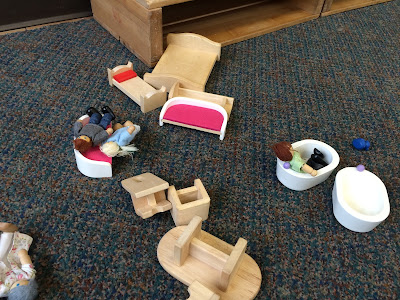Sometimes no matter what a toy manufacturer has in
mind, children find their own ways to use the toys. The way children use toys
is tied to where the child is developmentally, and what schemas
they’re using to explore their environment.
In my two and three year old classroom, we brought in
a basket of dollhouse furniture and small wooden dolls and put them near the
blocks. The children sometimes used toy animals as part of their block play, so
we wondered whether they would use the dolls or furniture as well.
Two and three-year-olds generally don’t engage in
pretend play where that involves acting out roles using representational objects.
At this age, pretend play typically involves object substitution (pretending
one object is another). And, interest in the objects themselves and exploration
of their physical properties is often more engaging than pretending.
Sure enough, one of the first aspects of the furniture
that the children noticed was that there were moving parts: doors and drawers
that open and close.
And of course, if it’s empty inside, you have to fill
it.
Some of the children used the furniture as building
materials, and figured out which ones stacked and which pieces could fit inside
other pieces.
One of the children did use the dolls with the
furniture, but that also involved just seeing what pieces fit inside each other. And after putting a doll in or on a piece of furniture, she moved on to something else.
The one piece of furniture that evoked pretend play
was the toilet, which makes sense, because using the toilet is a theme the
children are very personally involved with. But they didn’t use the dolls – it
was the small plastic sheep and bears that needed to “go potty”.
And of course, one of the best ways to explore a
material – any material – is to line up the pieces on a shelf at eye level.
My starting point for curriculum planning is to plan
based on what children might do with the toys, not on what the toys are.
Children will play their way with whatever we give them. It’s our job to
recognize the value of that play and build on it.







No comments:
Post a Comment